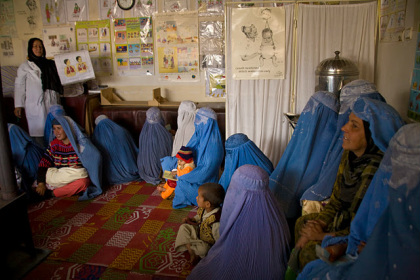Provide reproductive health workshops to 35 women, who will relay that information to their families and communities.
Why we care: Poor access to reproductive health information in rural Afghanistan
How we’re solving this: By empowering Afghan females to be healthy and keep their families healthy
The Afghan Institute of Learning, an Afghan women’s non-governmental organization, believes that Afghan women and girls have a right to good health. Since 1996, AIL has provided health education to 2.2 million women and children. As Afghan Institute of Learning doctors say, “One of the most powerful gifts that AIL has given to Afghan women and girls is health education, empowering Afghan females to be healthy and keep their families healthy.“
One of the most important health workshops that Afghan Institute of Learning offers is Women’s Reproductive Health. Afghan Institute of Learning continues to have many requests for this workshop in rural areas where women do not have access to health clinics. Your donation to this project will provide health education to 35 women, who will relay that information to at least 350 of their family members.
The Afghan Institute of Learning is an Afghan women’s non-governmental organization founded in 1995 by Dr. Sakena Yacoobi to help address the problem of poor access for Afghan women and children to education and health services, their subsequent inability to support their lives, and the impact of this lack of education and health on Afghan society. AIL is an organization, run by Afghan women, that plays a major part in reconstructing education and health systems capable of reaching the women and children of Afghanistan–whether in refugee camps or in their homes in Afghanistan.
Afghan Institute of Learning’s visionary programs have had a major impact on Afghanistan and its people. Between 1996 and June 2012, over 10 million Afghans have been direct beneficiaries of Afghan Institute of Learning education, training and health services. A number of Afghan Institute of Learning’s visionary programs have been replicated or adopted by the Afghan government and other organizations.


